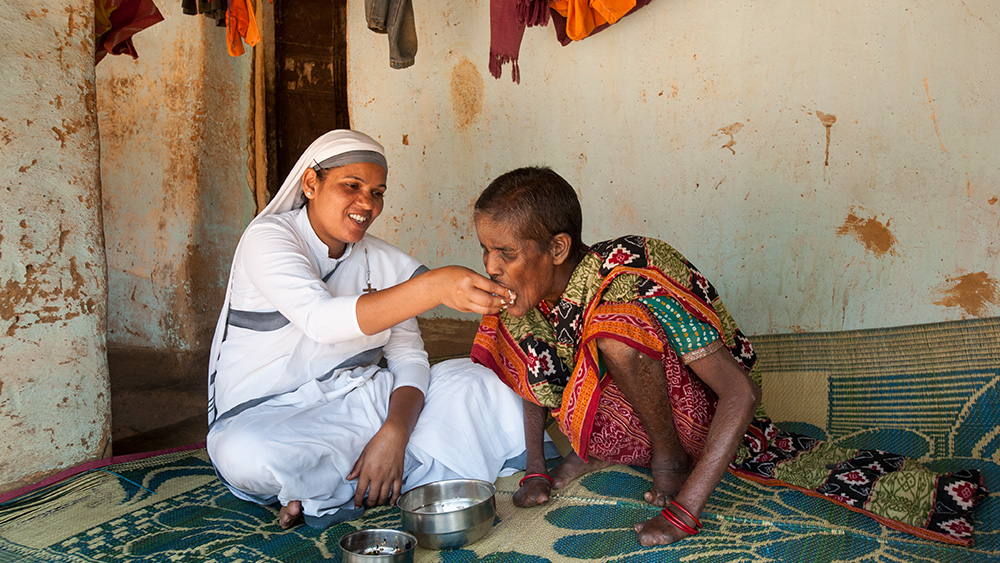Did you know that in our 21st century, leprosy is still a “death sentence,” though it can be cured with modern medicine if treated early? Untreated, it often means utter rejection and isolation that is more painful to endure than the disease itself. Often left untreated because of stigma, leprosy can cause crippling debilitation and leave its victims unable to perform everyday tasks. Who can provide lifesaving help and hope to people whose lives have been upended by leprosy – especially those cast out by their families?
A young Asian woman wearing a white robe and head-covering cradles an elderly woman’s feet that are horribly deformed by leprosy and gently washes them in a bowl of water.
The old woman can scarcely believe someone is touching her, caring for her, loving her. Most people would recoil from this woman and avoid the leprosy colony where she lives. The colony is a place of disease, disfigurement and disability. Its residents are used to being treated as outcasts by others and viewed as cursed. They are used to their deformed bodies being seen as objects of ugliness.
But to the young woman dressed in white, these feet are beautiful. She and her companions, known as Sisters of Compassion, come here regularly to clean wounds, cut hair and trim nails. They see beauty amid the truncated limbs and deeply scarred bodies that few are willing to look upon, let alone touch.
As locals and neighbours, the Sisters fully understand the culture and customs they pour their compassion into. They appreciate and respect the historical and religious traditions, speak the local language and know the nuances of the dialect. And they’re specially trained in leprosy wound care and family counselling.
To all this, they add the unspoken language of Christ’s love.
“We do all this because of the love of God,” says Geeta, one of the Sisters trained to care for people with leprosy.
No one else could have the impact these women are having on their own people, often their neighbours. Their roots of love go deep, and their branches of compassion reach into places where no one else goes.
While their long white robes, known as saris, might appear unusual attire to Western eyes, their significance in South Asia is huge. The Sisters’ simple hand-spun uniform mirrors the traditional sari once worn by the lowliest of servants in Asia. It says to the old woman whose body has been disfigured with leprosy: “I am here to serve you. I see your worth.”
Mungeli Das, who contracted leprosy as a little girl more than 50 years ago, was treated for five years before being cured. Because of the deformity left by the disease, the leprosy colony has been her home for decades. She clings to the help and hope the Sisters of Compassion bring her. The Sisters follow the example of Jesus who, according to the Gospels, touched and healed those, like Mungeli, with leprosy.
“Before the Sisters came, there was no one to help trim our hair, cut our nails or help us clean our houses and encourage us,” Mungeli says. “The Sisters help us by cleaning our wounds, and they make us happy and encourage us all the time.”
In places where outsiders, foreigners and foreign mission workers are prohibited or restricted, national workers and national missionaries have much more opportunity to serve. These women and men are welcomed and considered trustworthy counsellors and friends of the community.
Outsiders may come and go. But national missionaries, such as GFA World’s Sisters of Compassion, stand the test of time.
“Each woman who serves as a Sister of Compassion is full of sacrificial love, just like Jesus,” explains GFA World. “They do the most unglamorous things, such as bathing someone … or feeding people who’ve been affected by leprosy and no longer have any fingers to feed themselves.”
Sisters of Compassion offer loving help for leprosy patients’ everyday needs, alleviating their suffering and offering the hope found in Christ.
Would you consider providing help that will enable our teams to bring Christ’s love, compassion and care to these precious people, where it will touch the heart of God, who through Christ our dear Lord and Saviour, loves them dearly?
Please pray for compassionate help and hope!
Email This Story
Why not send this to a friend?


